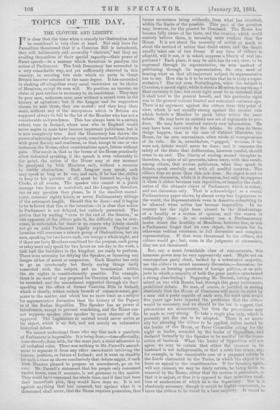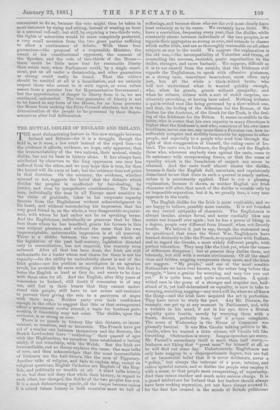TOPICS OF THE DAY.
THE CLOTURE AND LIBERTY.
IT is clear that the time when a remedy for Obstruction must be considered is very close at hand. Not only have the Parnellites threatened that if a Coercion Bill is introduced, they will deliberately and avowedly " obstruct," but they are availing themselves of their special capacity—their power of fluent speech—in a manner which threatens to paralyse the action of Parliament. The Irish Democracy has succeeded in a very remarkable way, not yet sufficiently observed in this country, in securing two ends which no party in Great Britain has ever attained in the same degree. It has succeeded in shaking off altogether every usual restriction on its choice of Members, except its own will. No position, no income, no claim of past service is necessary to its candidates, They may be poor men, unknown men, men without a record even in the history of agitation ; but if the League and its supporters choose to seat them, they are seated ; and they keep their seats, without any of the annoyances which in Britain are supposed always to fall to the lot of the Member who has not a considerable independence. This has always been to a certain extent true in Ireland, where men who in, England would never aspire to seats have become important politicians, but it is now completely true. And the Democracy has shown the power of selecting men who can speak, sometimes well, but always with great fluency and readiness, so that, except in one or two instances, the House, other considerations apart, listens without pain. The result is, that as the forms of the House practically allow unlimited speaking, if the speech is oven colourably to the point, the action of the House may at any moment be paralysed by Irish Members only, without a recourse to visible obstruction. Each Leaguer may speak, each may speak as long as he can, and each, if he has the ability to keep to his question at all, must be listened to,—by the Clerks, at all events. Tho speaker who cannot at a pinch manage two hours is maladroit, and the Leaguers, therefore, can on any question they please, be it the smallest amend- ment, consume eighty hours, or seven Parliamentary sittings of the extremest length. Should this be done—and it begins to be believed that this is the intention—it is clear that action in Parliament is not delayed, but entirely prevented. The notion that by waiting " oven to the end of the Session," as one opponent of the cloture puts it, the difficulty can be over- come, is unfounded, for there is no reason why debate should not go on until Parliament legally expires. Physical ex- haustion will overcome a minute group of Obstructives, but six men, speaking for two hours each, can occupy a whole night, and if there are forty Members combined for the purpose, each group or relay need only speak for two hours on one day in the week, a task half the barristere in the kingdom are ready to perform. There is no necessity for defying the Speaker, or incurring any danger either of arrest or suspension. Each Member has only to go on courteously but firmly saying things fairly connected with the subject, and no termination within the six nights is constitutionally possible. For example, there is no word of any proposal for Coercion which may not be amended, and the amendment supported through six days' speaking on the effect of former Coercion Bills in Ireland, which is clearly, within certain bounds of common-sense, ger- mane to the matter, and which has no more limit as a subject for argumentative discussion than the history of the Papacy or of the Italian Republics. The Speaker has no power of interference, except to prevent wandering, and the House can- not suppress speaker after speaker by mere clamour of dis- approval. The Legislature so resisted would never arrive at its object, which is an Act, and not merely an exhaustive historical debate.
We cannot understand those who say that such a paralysis of Parliament is impossible. It is being done,—done effectually, done cleverly, done with, for the most part, a strict adherence to all technical rules. There was nothing in Mr. Parnell's amend- ment to separate it from any other amendment involving the history, position, or future of Ireland; and it went on steadily for such a time as shows conclusively that debate might, if each Irish Member pleased to propose an amendment, go on for ever. Mr. Parnell's statement that his people only consumed twelve hours, even if accurate, is not germane to the matter. They could have consumed the whole time, and if that had been their immediate plan, they would have done so. It is not agiinst anything that has occurred, but against what it is threatened shall occur, that the House requires protection, that future occurrence being evidently, from what has occurred, within the limits of the possible. This past of the question may, however, for the present be dismissed. The House has become fully aware of the facts, and the country, which could scarcely believe them, is becoming more resolute than the House. It is not about the necessity of action so much as about the method of action that doubt exists, and the doubt usually takes one of two forms. If any form of cldture is adopted, will it not, it is asked, suppress a liberty of real im- portance I Each place, it may be said, has its own view, to be expressed through its representative, its own method of petitioning through its representative, its own need of hearing what on that all-important subject its representative has to say. How else is it to bo certain that he is truly a repre- sentative ? Has not even Portarlington, when the subject is
Coercion, a moral right, while it elects a Member, to say its say i Most certainly it has; but every right must be so exercised that
it shall tend to the general benefit, and this particular right was in the general interest limited and restrained centuries ago. There is no argument against the ciature from this point of view, which is not equally strong against the ancient rule which forbids a Member to speak twice within the same debate. He may have an entirely new set of arguments to pro- duce. He may have received entirely new information. He may have been converted by the debate. So often do those things happen, that in the ease of Cabinet Ministers, the House, for its own convenience, often winks at transgressions of its rule. He is, nevertheless, " gagged," because, if ho were not, debate would never be done ; and it concerns the safety of the State that deliberation, however careful, should come to an end. The liberty of stating second thoughts is; therefore, in spite of all proverbs, taken away, with this result, among others, that serious politicians, when they speak in debate, speak carefully and with all needful reserves. The cloture does no more than this rule does. Its object is not to suppress discussion, while it is discussion, but only to suppress it when it either becomes vain repetition, or impedes the reali- sation of the ultimate object of Parliament, which is action, and not discussion only. That is acknowledged, as a recent Parliamentary paper shows, by almost every free Legislature in the world, the Representatives even in America submitting to be silenced when action has become imperative. In no country has the right been abused, to the dieadvantage of a locality or a section of opinion, and the reason is sufficiently clear. In no country can a Parliamentary leader desire the hostility of Members, however few, or can
a Parliament forget that its own object, the reason for its otherwise tedious existence, is full discussion and complete representation. If that were threatened by the cloture, the cloture would go ; but, even in the judgment of extremists, they are not threatened.
But, say a more formidable class of remonstrants, this immense power may be very oppressively used. Might not an unscrupulous party chief, backed by a submissive majority,.
use the clOture to arrest necessary discussion,—discussion, for example, on burning questions of foreign politics, or on sub- jects in which a majority of both the great parties entertained a strong class-feeling I Supposing Mr. Disraeli, having data- mined on war with Russia, had, through this great instrument, prohibited debate, No man, of course, is justified in stating absolutely that the House of Commons will never be ruled by a man and a party capable of such acts, for most men would five years ago have rejected the prediction that the clOture would be necessary, and we should be the last to suggest that precautions are unnecessary, but then the precautions may be made so very strong. To take a single plan only, which is probably not the one to be adopted. There is no neces- sity for allowing the cloture to be applied, unless moved by the leader of the House, or Privy Councillor acting for the night as leader, seconded by the leader of Opposition, and declared formally by the Speaker to be needful for the trans- action of business, When the leader of Opposition will not agree, we may be certain that either the measure to be hastened is not indispensable, or that a crisis has arisen, say, for example, in the conceivable case of a proposed reform in
the Lords obstructed by the Tories, in which the object is to, force an appeal to the constituencies. If the Speaker, again,
will not consent, we may be fairly certain, he being liable to removal by the House, either that the motion is premature, or that it is unjust, or that it is opposed to that unwritten tradi-
tion of moderation of which he is the depositary. Nor is it absolutely necessary, though it would be highly convenient, to leave the clOiture to be voted by a bare majority. It would be convenient to do so, because the vote might then be taken in most instances by rising and sitting, instead of wasting an hour in a nominal roll-call; but still, by requiring a two-thirds vote, the rights of minorities would be more completely protected, a very small secession from the two great parties sufficing to allow a continuance of debate, With these four guarantees—the proposal of a responsible Minister, the assent of his constitutional opponent, the consent of the Speaker, and the vote of two-thirds of the House— there could be little more fear for reasonable liberty than exists now, when Parliament could, by a single enact- ment, put us all under a dictatorship, and other guarantees as strong could easily be found. That the chiture should be needful at all is a humiliation, and we entirely respect those who assent to it with regret, or even refuse assent from a genuine fear for Representative Government ; but the apprehension of danger to liberty from it is, we are convinced, unfounded. The true guarantee of liberty is not to be found in any form of the House, for no form prevents the House from making the Privy Council absolute, but in the determination of the people to be governed by their Repre- sentatives after full deliberation.



































 Previous page
Previous page